Angela Ackerman's Blog: Writers Helping Writers, page 175
August 28, 2012
The Power of THEME
I'm happy to welcome back Dr. John Yeoman of Writer's Village, a writing community dedicated to helping writers succeed. You might remember his last post, Want To Write A Bestseller? Change Your Mind! that focused on how a writer can create fresh description through altering our perspective.
Today he's covering a difficult area for many of us--the importance of THEME to create richness and meaning in our stories. John always offers thoughtful advice, so please, read on!
~ ~ ~
 Strong stories have great themes. They may also have great plots but, for a story to endure, theme is everything. Plot is what happens. Theme is the why.
Strong stories have great themes. They may also have great plots but, for a story to endure, theme is everything. Plot is what happens. Theme is the why.
A theme is the meaning of a story. As humans, we lust for meaning, for pattern in all things, including fiction.
How do we power our stories with a great theme?
A story with a theme that’s too upfront is a manifesto. (Think of the polemics of Ayn Rand.) Far more readable is the story where a theme, grounded in some primal human drive, works its way to the surface slowly through incident, character and behavior.
For example, imagine a story where a man climbs a mountain, alone and in bad weather, and has to be rescued by a helicopter. Is that a story? No, it’s a news report.
But suppose he goes on that foolhardy climb to prove to himself - and his girl - that he is not a coward? And he succeeds. The world scorns him as an idiot but his girl knows better.
Now the tale has meaning. Its theme might be: ‘A man can only find his life when he is prepared to lose it.’ Well told, that might be a great story.
Here are two ways to endow your story with a strong theme:
1. You’ve written a story already...
Craft a plot in the usual way, replete with Obstacles, Setbacks, Conflicts and Twists. Then look for the theme that’s already there.
Suppose you write a horror story about a young couple who honeymoon on a remote island. The locals warn them it’s haunted. To placate the ghosts, they must follow some bizarre ritual. They scoff. Weeks later, their bodies are discovered - their faces contorted with horror.
Is that a story? No. It’s banal. But suppose the couple are pictured as scientists, worshipers of technology. Now we have a theme: ‘Only fools laugh at ancestral wisdom.’
If you can’t sum it up in a proverb, you don’t have a theme.
In summary: write a story that works. Then stand back from it and ask: ‘what does this story mean?’ And strengthen the latent theme or axiom that’s already there.
2. You have a theme but no story...
Imagine that you burn with a secret vision, an affiliation to some great cause - or just a deep sense of anger. It’s tempting to write a novel where your hero(ine) puts the world to rights. Or, at least, sets off the fire alarms.
Don’t do it. Your story won’t even get published.
One solution is to tell your story from the viewpoint of someone who represents the polar opposite of your own opinions. Gain your reader’s sympathy, howsoever unlikely, for that person. Then show them changing their views under the pressure of events.
As their mind changes, so will that of the reader.
Here’s a provocative example.
Imagine you’re on a personal crusade to reveal the villainy of Google. You just know that Google plans to take over the world.
Do you show Google’s chief programmer, Joe, beaming like Fu Manchu as he plots world domination? No. These are nice guys and gals. They have open access offices with climbing walls!
Instead, picture Joe as a decent fellow, brilliant but naive. He has always scoffed at calls for Google to regulate itself. Then he bumps into an old girl friend whose life has been ruined by a criminal who stalked her using Google apps.
Hm... he sees the point of self-regulation. He commends it to the Google board. However, opposing him is another top executive, Sam. He does plan world domination. He sets out to suppress Joe...
At the end, Joe is in hiding - pursued by Sam’s assassins. Joe is developing a super-virus that will destroy Google. But does he have the right to do it? The novel closes on that moral question.
And readers will draw their own conclusions.
You don’t have to state: ‘Google is evil’. It isn’t. But readers will get the scary message. If the book sells well and is widely discussed, so will legislators. Mission accomplished.
What is the story’s theme? Perhaps ‘for evil to triumph, it requires only that good men do nothing’? Of course, if you love Google you might detect a different theme: ‘You can’t suppress a great idea when its time has come’.
To summarize, for a story to be enduringly successful, it must embody a theme of timeless appeal.
1. If you write your story first, and it works... deepen it by bringing out the latent theme that’s already there.
2. If you find your theme first... examine it from a multiplicity of points of view and coax the reader to draw their own conclusions.
~ ~ ~ Dr John Yeoman, PhD Creative Writing, judges the Writers’ Village story competition and is a tutor in creative writing at a UK university. He has been a successful commercial author for 42 years. A wealth of further ideas for writing fiction that sells can be found in his free 14-part story course at:
Dr John Yeoman, PhD Creative Writing, judges the Writers’ Village story competition and is a tutor in creative writing at a UK university. He has been a successful commercial author for 42 years. A wealth of further ideas for writing fiction that sells can be found in his free 14-part story course at:
http://www.writers-village.org/program
A road map to finding your Theme? How much do you love this post? Please check out John's blog for more nuggets of wisdom, and if you like, come visit me at Jami Gold's blog as I tackle Characters Who Lie and their unique body language TELLS.

Today he's covering a difficult area for many of us--the importance of THEME to create richness and meaning in our stories. John always offers thoughtful advice, so please, read on!
~ ~ ~
 Strong stories have great themes. They may also have great plots but, for a story to endure, theme is everything. Plot is what happens. Theme is the why.
Strong stories have great themes. They may also have great plots but, for a story to endure, theme is everything. Plot is what happens. Theme is the why.A theme is the meaning of a story. As humans, we lust for meaning, for pattern in all things, including fiction.
How do we power our stories with a great theme?
A story with a theme that’s too upfront is a manifesto. (Think of the polemics of Ayn Rand.) Far more readable is the story where a theme, grounded in some primal human drive, works its way to the surface slowly through incident, character and behavior.
For example, imagine a story where a man climbs a mountain, alone and in bad weather, and has to be rescued by a helicopter. Is that a story? No, it’s a news report.
But suppose he goes on that foolhardy climb to prove to himself - and his girl - that he is not a coward? And he succeeds. The world scorns him as an idiot but his girl knows better.
Now the tale has meaning. Its theme might be: ‘A man can only find his life when he is prepared to lose it.’ Well told, that might be a great story.
Here are two ways to endow your story with a strong theme:
1. You’ve written a story already...
Craft a plot in the usual way, replete with Obstacles, Setbacks, Conflicts and Twists. Then look for the theme that’s already there.
Suppose you write a horror story about a young couple who honeymoon on a remote island. The locals warn them it’s haunted. To placate the ghosts, they must follow some bizarre ritual. They scoff. Weeks later, their bodies are discovered - their faces contorted with horror.
Is that a story? No. It’s banal. But suppose the couple are pictured as scientists, worshipers of technology. Now we have a theme: ‘Only fools laugh at ancestral wisdom.’
If you can’t sum it up in a proverb, you don’t have a theme.
In summary: write a story that works. Then stand back from it and ask: ‘what does this story mean?’ And strengthen the latent theme or axiom that’s already there.
2. You have a theme but no story...
Imagine that you burn with a secret vision, an affiliation to some great cause - or just a deep sense of anger. It’s tempting to write a novel where your hero(ine) puts the world to rights. Or, at least, sets off the fire alarms.
Don’t do it. Your story won’t even get published.
One solution is to tell your story from the viewpoint of someone who represents the polar opposite of your own opinions. Gain your reader’s sympathy, howsoever unlikely, for that person. Then show them changing their views under the pressure of events.
As their mind changes, so will that of the reader.
Here’s a provocative example.
Imagine you’re on a personal crusade to reveal the villainy of Google. You just know that Google plans to take over the world.
Do you show Google’s chief programmer, Joe, beaming like Fu Manchu as he plots world domination? No. These are nice guys and gals. They have open access offices with climbing walls!
Instead, picture Joe as a decent fellow, brilliant but naive. He has always scoffed at calls for Google to regulate itself. Then he bumps into an old girl friend whose life has been ruined by a criminal who stalked her using Google apps.
Hm... he sees the point of self-regulation. He commends it to the Google board. However, opposing him is another top executive, Sam. He does plan world domination. He sets out to suppress Joe...
At the end, Joe is in hiding - pursued by Sam’s assassins. Joe is developing a super-virus that will destroy Google. But does he have the right to do it? The novel closes on that moral question.
And readers will draw their own conclusions.
You don’t have to state: ‘Google is evil’. It isn’t. But readers will get the scary message. If the book sells well and is widely discussed, so will legislators. Mission accomplished.
What is the story’s theme? Perhaps ‘for evil to triumph, it requires only that good men do nothing’? Of course, if you love Google you might detect a different theme: ‘You can’t suppress a great idea when its time has come’.
To summarize, for a story to be enduringly successful, it must embody a theme of timeless appeal.
1. If you write your story first, and it works... deepen it by bringing out the latent theme that’s already there.
2. If you find your theme first... examine it from a multiplicity of points of view and coax the reader to draw their own conclusions.
~ ~ ~
 Dr John Yeoman, PhD Creative Writing, judges the Writers’ Village story competition and is a tutor in creative writing at a UK university. He has been a successful commercial author for 42 years. A wealth of further ideas for writing fiction that sells can be found in his free 14-part story course at:
Dr John Yeoman, PhD Creative Writing, judges the Writers’ Village story competition and is a tutor in creative writing at a UK university. He has been a successful commercial author for 42 years. A wealth of further ideas for writing fiction that sells can be found in his free 14-part story course at:http://www.writers-village.org/program
A road map to finding your Theme? How much do you love this post? Please check out John's blog for more nuggets of wisdom, and if you like, come visit me at Jami Gold's blog as I tackle Characters Who Lie and their unique body language TELLS.

Published on August 28, 2012 03:31
August 25, 2012
Plot Whisperer WINNERS!
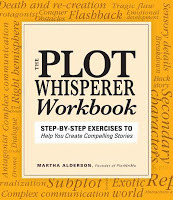 Hi everyone! Wow, wow, wow! Thank you all for making Martha feel right at home here at The Bookshelf Muse. I loved reading all your comments and listening to your processes. I definitely see I'm not the only one trying to better structure my pantsing ways, and it's good to know I'm not alone. Thank goodness there's tools out here like Martha's books to help!
Hi everyone! Wow, wow, wow! Thank you all for making Martha feel right at home here at The Bookshelf Muse. I loved reading all your comments and listening to your processes. I definitely see I'm not the only one trying to better structure my pantsing ways, and it's good to know I'm not alone. Thank goodness there's tools out here like Martha's books to help!She was so thrilled to see so many people enter for her giveaway that she asked that I pick out 5 winners instead of 3. WOOT! I feel like Santa on Christmas, I do.
So, via the Gods at Random.org, I'm happy to announce that...
Amy McBay LMEighmyLinda A. Tom Franklin Debbie Maxwell Allen
Have all won a copy of The Plot Whisperer Workbook: Step-by-Step Exercises to Help You Create Compelling Stories
 ! *bacon cannon* *donut sprinkles* *glitter pom poms*
! *bacon cannon* *donut sprinkles* *glitter pom poms*I know you all are going to love this book, so congrats! And a big thank you for cheering Martha on and being so supportive of a fellow writer. That is what makes this community great!I do encourage everyone to check out Martha's Website and sign up for her newsletter to get all the best tips on plotting!
I hope you all have a fabulous weekend :)

Published on August 25, 2012 03:27
August 23, 2012
The Plot Whisperer: Benefits of Plotting in Scenes + GIVEAWAY
 I am triple-fudge-sundae excited to welcome Martha Alderson (aka The PLOT WHISPERER) to The Bookshelf Muse as she sends The Plot Whisperer Workbook: Step-by-Step Exercises to Help You Create Compelling Stories
I am triple-fudge-sundae excited to welcome Martha Alderson (aka The PLOT WHISPERER) to The Bookshelf Muse as she sends The Plot Whisperer Workbook: Step-by-Step Exercises to Help You Create Compelling Stories off into the world. This workbook is a companion to the incredibly popular The Plot Whisperer: Secrets of Story Structure Any Writer Can Master
off into the world. This workbook is a companion to the incredibly popular The Plot Whisperer: Secrets of Story Structure Any Writer Can Master . Martha as you may remember, was featured as a Writing Hero not too long ago, and in true helping fashion, is generously offering a copy of her new Plot Whisperer Workbook to 3 lucky commenters!
. Martha as you may remember, was featured as a Writing Hero not too long ago, and in true helping fashion, is generously offering a copy of her new Plot Whisperer Workbook to 3 lucky commenters!Here's Martha on the Benefits of Plotting in Scenes!
~ ~ ~
Some writers write by the seat of their pants. Others prefer to pre-plot first, write after. Some write and plot, write and plot, write and plot. Eventually, every writer who sticks with her writing achieves a draft or a partial made up of scenes. The leap from the generative stage of writing scenes to the analytical stage of analyzing what you have written often leave writers frozen or in a tangled heap.
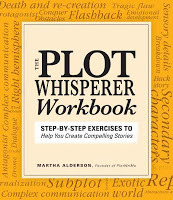 Analyze Your Plot by Scenes
Analyze Your Plot by ScenesIn a scene a character acts and reacts to people, places, and events. In this respect, scenes are the basic building blocks of your story. But, as with any structure, if you have the wrong scenes or if they’re assembled incorrectly, your story can—unexpectedly—collapse.
Before you can create a visual map for analyzing critical story information, presentation flow, and the overall story sequence, you have to have scenes. Likely, you have heard the writer’s mantra: “Show, don’t tell.” Summary tells. Scenes show.
I use the following partial scene from the middle-grade Newbery Medal-winning novel Holes by Louis Sachar, an example for analyzing a scene from my workbook.
Stanley Yelnats has been unjustly sent to a boys’ detention center where the boys build character by spending all day, every day, digging holes exactly five feet wide and five feet deep.
[Stanley] glanced helplessly at his shovel. It wasn’t defective. He was defective. He noticed a thin crack in the ground. He placed the point of his shovel on top of it, then jumped on the back of the back with both feet.The shovel sank a few inches into the packed earth.He smiled. For once in his life it paid to be overweight.He leaned on the shaft and pried up his first shovelful of dirt, then dumped it off to the side.Only ten million more to go, he thought, then placed the shovel back in the crack and jumped on it again.He unearthed several shovelfuls of dirt in this manner, before it occurred to him that he was dumping his dirt within the perimeter of his hole. He laid his shovel flat on the ground and marked where the edges of his hole would be. Five feet was awfully wide. He moved the dirt he’d already dug up out past his mark. He took a drink from his canteen. Five feet would be awfully deep, too.
Scenes that Show Emotion
This scene, as do all good scenes, shows moment-to-moment action in real story time. The reader experiences the work as Stanley does it and learns about the protagonist, not because the author tells us but because he shows us through Stanley’s actions. We learn the protagonist is overweight and can laugh at himself. We learn he has staying power because rather than give up and suffer the consequences he finds a way to break the earth open. We learn he is bright in that he quickly realizes his mistake in dumping the dirt within the perimeter of his hole and immediately rectifies the situation.
The details of Stanley jumping on the back of the shovel blade with both feet, leaning on the shaft, measuring the hole, and taking a drink from his canteen draw the reader into the moment of the scene. The reader attaches viscerally to the fleeting happiness Stanley feels at being heavy enough to sink the shovel a few inches into the packed earth, his despondency when he understands how wide five feet actually is, his momentary success in prying up his first shovelful, and his disappointment in counting “only ten million more to go”––not to mention his despair when he acknowledges the full magnitude of the task in front of him.
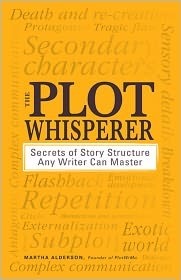 Create a List of Scenes
Create a List of Scenes A partial list of scenes from the beginning of the award-winning middle grade novel Esperanza Rising by Pam Munoz Ryan is an example used in the companion Plot Whisperer Workbook.
The novel is set during the time of the American Great Depression and is about a young Mexican girl, who’s sense of self is stripped when she and her mother are forced to leave their life of privilege in Mexico for an uncertain future in the United States as farm workers.
In analyzing Esperanza Rising, create a list of the novel’s scenes (we only went a couple of scenes past the one-quarter mark and into the middle of the story). For your exercise, list your scenes all the way to the end of your story. Shorten scene titles while still capturing the major plot elements of the scene. Each scene title should take up no more than one line of the following scene list.
It’s not necessary for you to have written all (or any) of your scenes. Just list scene ideas in the order in which you envision them landing in your story. If your book is made up of many small chapters, each one encapsulating a scene, list events in the story by chapter.
The trick to this exercise is not to see how many scenes you can list. Instead, you want to identify and list scenes that advance the story on a multitude of plot levels.
Remember that it may take you several tries before you get the list in an order that satisfies you. For this reason, I recommend using a pencil instead of a pen, so you can erase parts of your first ordering and move scenes around. Also remember that it’s often a good idea to try out this exercise using scenes from a favorite book. The more you practice this analysis and construction, the better you’ll get at it.
~ ~ ~
 Martha Alderson, aka the Plot Whisperer, is the author of The Plot Whisperer Workbook: Step-by-Step Exercises to Help You Create Compelling Stories
Martha Alderson, aka the Plot Whisperer, is the author of The Plot Whisperer Workbook: Step-by-Step Exercises to Help You Create Compelling Stories
– a companion workbook to The Plot Whisperer: Secrets of Story Structure Any Writer Can Master
 (Adams Media, a division of F + W Media). She has also written Blockbuster Plots: Pure & Simple
(Adams Media, a division of F + W Media). She has also written Blockbuster Plots: Pure & Simple (Illusion Press) and several ebooks and dvds on plot, including a dvd for writers of children’s and young adult novels. As an international plot consultant for writers, Martha’s clients include best-selling authors, New York editors, and Hollywood movie directors. She teaches plot workshops to novelists, memoirists, and screenwriters privately, at plot retreats, through Learning Annex, RWA, SCBWI, CWC chapter meetings, at writers' conferences and Writers Store where she takes writers beyond the words and into the very heart of a story.
(Illusion Press) and several ebooks and dvds on plot, including a dvd for writers of children’s and young adult novels. As an international plot consultant for writers, Martha’s clients include best-selling authors, New York editors, and Hollywood movie directors. She teaches plot workshops to novelists, memoirists, and screenwriters privately, at plot retreats, through Learning Annex, RWA, SCBWI, CWC chapter meetings, at writers' conferences and Writers Store where she takes writers beyond the words and into the very heart of a story.As the founder of Blockbuster Plots for Writers and December, International Plot Writing Month, Martha manages an award-winning blog for writers, awarded by Writers Digest 2009, 2010, 2011, 2012. Her vlog, How Do I Plot a Novel, Memoir, Screenplay covers 27 steps to plotting your story from beginning to end. Find her on Twitter, and if you like, add her workbook to your Goodreads list!
Would you like to take your writing to the next level with Martha's intuitive Plot Whisperer Workbook? This giveaway is open internationally, so just leave a comment with some contact info and share if you plot your scenes already, or if this is a technique you'd like to try. As always, tweets and shares are greatly appreciated. Good luck, everyone!

Published on August 23, 2012 03:41
August 21, 2012
Always Look on the Bright Side
I don't want to alarm anyone, but historically, the week of August 21st has been kind of a downer. Not one, but TWO volcanoes erupted: Krakatoa, in 1883, and Vesuvius in 79, which killed pretty much everybody.

Pompeii: Before

Pompeii: After
What does this have to do with anything? It only reinforces the fact that no matter how bad you've got it, things could always be worse. Too hot in south Florida to even step outside? Not as hot as being buried in lava. My son refusing to poopy on the big potty? Better than mushroom clouds and 3" pumice hailstones. So be encouraged, people. And if you happen to live near an active volcano...well, vaya con Dios.
On an up note, some super nice people have invited me to post at their blogs, so today, you can find me at...
I Am Alive, wherein I discuss my bucket list of favorite literary settings
Finding Bliss, wherein I share some useful self-publishing tips
Keyboard & Camera, wherein I wax philosophical with the 15-year-old Becca
Have a productive, uplifting, and non-apocalyptic week!


Pompeii: Before

Pompeii: After
What does this have to do with anything? It only reinforces the fact that no matter how bad you've got it, things could always be worse. Too hot in south Florida to even step outside? Not as hot as being buried in lava. My son refusing to poopy on the big potty? Better than mushroom clouds and 3" pumice hailstones. So be encouraged, people. And if you happen to live near an active volcano...well, vaya con Dios.
On an up note, some super nice people have invited me to post at their blogs, so today, you can find me at...
I Am Alive, wherein I discuss my bucket list of favorite literary settings
Finding Bliss, wherein I share some useful self-publishing tips
Keyboard & Camera, wherein I wax philosophical with the 15-year-old Becca
Have a productive, uplifting, and non-apocalyptic week!

Published on August 21, 2012 06:00
August 18, 2012
Character Trait Entry: Sentimental
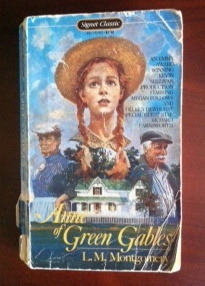
Definition : being overly influenced by feelings
Causes : natural predisposition, having an overly sentimental parent, wanting the attention that comes when excess emotion is expressed, an inability to move beyond highly emotional events in one's past, being deeply in tune with one's own emotions and wanting to experience them frequently
Characters in Literature: Anne Shirley, Mrs. Weasley, Cecily (Wither)
Positives : Sentimentals are in touch with their feelings. They don't see the need to hide their emotions, and so are usually transparent and honest in their expressions. Because their emotions are often wrapped up in the people around them, Sentimentals tend to be people-oriented. They are often unselfish and focused on others.
Negatives : Because of the Sentimental's tendency toward emotionality, they often clash with people who are more practical, and are misunderstood as weak, melodramatic, and unrealistic. Their demonstrative nature may make others uncomfortable. Sentimentals can often get so caught up in the past that they neglect the present or the future. Their sentimentality can sometimes lead them to see events how they want to see them instead of how they actually are.
Common Portrayals: women, teenage girls, children
Clichés to Avoid: the nostalgic mother crying over her child's latest milestone; those in declining years constantly reminiscing about the good old days; the hugely pregnant, hormone driven mother-to-be
Twists on the Traditional Sentimental:
Again, in literature, this trait is largely represented by the female gender. What about a sentimental man who's driven more by emotion than logic?
Sentimentality and practicality don't usually go together. Try throwing a sentimental into a traditionally practical career field: the sentimental accountant, mathematician, IT professional, mechanic
Conflicting Characteristics to Make your Sentimental Unique or More Interesting: precise, negative, cruel, rude, miserable, easygoing, serious

Published on August 18, 2012 00:00
August 16, 2012
How to Start Your Synopsis: One Strategy + GIVEAWAY
The dreaded Synopsis. Does the word fill you with shakes and send you skittering off to check other important things like what new funnies are in your Facebook feed, whose cat coughed up a hairball the size of Manhattan on Twitter, and what companies want to sell you unwanted Viagra in your spam box? Well, you aren't alone. Even the most seasoned of writers feel a twinge of hopelessness at the idea of crafting a synopsis. And the worst part? The Opening line.
 Lucky for us, author Lee Mackenzie is here from The Write Game to share her awesome technique to nail your Synopsis opening. If you struggle with where and how to start a synopsis, read on!
Lucky for us, author Lee Mackenzie is here from The Write Game to share her awesome technique to nail your Synopsis opening. If you struggle with where and how to start a synopsis, read on!
~ ~ ~We know that a synopsis is written in 3rd person/present tense. It should be in the same style as your book, so if your book is humorous or "chatty," your synopsis should be as well. It should introduce your main characters and their conflicts, and it must weave together these story elements so ideas flow logically from one paragraph to another.
All of that is doable, but not easy. I probably don't have to write that for those who have tried synopses, but I'll add it in case someone reading this hasn't wrestled one of these beasties into shape.
My biggest problem is how to start. I want that first paragraph to have "Ta da!" in it. I want the reader so captivated by my characters and their situation that they won't stop until they reach the end. Unfortunately, if I start with an inciting event, I often wind up producing a piece that's preoccupied with plot. The emotion, conflict, characters and how they change become buried.
I want to avoid the "first this happens, then that happens." But how?
Here's one strategy that helps me. I write the inciting event as if it were to be the first sentence of my synopsis, then I write my reaction to that event. Next, I delete that first sentence. Here's what I mean.
Sliding on the Edge (Fall, 2009)
Inciting Event: Shawna Stone's mother abandons her, leaving her to survive on her own in Las Vegas.
Paragraph 1 of Synopsis: Shawna has spent the first sixteen years of her life in Las Vegas, learning how to dodge her mother’s sleazy boyfriends, how to separate tourists from their cash, and how to make ketchup soup. Now her mother has taken off with the latest boyfriend, leaving Shawna with nothing but a hundred-dollar bill and a bus ticket for a journey to find a grandmother she’s never met—Kay Stone.
1-The event is important to the plot, but it’s dull reading. However, if I use it as a springboard I can put my MC right up front and surround her with details of her setting--a setting that has created this girl with the “bad ass attitude” whom the readers are about to meet. IMO that does two things: it creates empathy for someone who’s not all that likable at first, and it sketches in the backstory very lightly.
2- Reacting to the event also allows me to react to the mother so the readers know her immediately. Sleazy refers to the boyfriends, but it quickly characterizes the mother, too.
3-The story pivots on meeting the grandmother, so I wanted to introduce Kay at the beginning, while keeping the focus on Shawna and her situation.
Alligators Overhead (July, 2012)
Inciting Event: A mysterious mansion materializes at the edge of the Ornofree swamp and next door to where Pete Riley lives.
Paragraph 1 of Synopsis: Alligators, witches and a spooky mansion aren't your average neighbors unless you live at the edge of the Ornofree swamp in the backwater town of Hadleyville. The town's bad boy, Pete Riley, may only be twelve, but he's up to his eyeballs in big trouble, and this time he isn't the cause. This time the trouble arrives when a legendary hundred-year-old mansion materializes next door and the Ornofree alligators declare war to save their swamp from bulldozers.
1-The setting in this story is a major “character.” I wanted readers to experience the unique atmosphere immediately, so I put it into the opening sentence.
2-I wanted to establish Pete and his place in this peculiar town, but with an economy of words. I thought calling him a “bad boy” was the best way to do this; to me it made him sound like a charming rascal, but kept the tone of the book.
3-The plot turns on the reappearance of the mansion, so it had to be in the first paragraph along with those alligators that play such an important role in the story.
In these examples, the inciting event is in the opening paragraph; it just isn’t the first sentence. Whenever I did that it led me to very pedestrian and plot focused synopses.
If you try this strategy, let me know if it helps! I’m always interested in finding out if I’m on the right track.
~ ~ ~
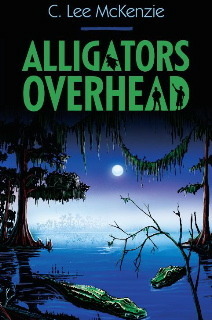 I don't know about you, but I think that is some of the best advice I've ever heard on how to start a synopsis! And, did anyone else notice how well it works as an opening line for a query pitch? *wink wink*
I don't know about you, but I think that is some of the best advice I've ever heard on how to start a synopsis! And, did anyone else notice how well it works as an opening line for a query pitch? *wink wink*
AND, The awesomeness isn't over friends! Lee is generously offering 3 copies of her new Middle Grade Adventure book, Alligators Overhead , one print (US only), two ebook (Worldwide, any format!). Here's a blurb:
Alligators, witches and a spooky mansion aren't your average neighbors unless you live at the edge of the Ornofree swamp in the backwater town of Hadleyville. The town's bad boy, Pete Riley, may only be twelve, but he's up to his eyeballs in big trouble, and this time he isn't the cause. This time the trouble arrives when a legendary hundred-year-old mansion materializes next door and the Ornofree alligators declare war to save their swamp from bulldozers. Things only get worse when Pete's guardian aunt and several of her close friends vanish while trying to restore order using outdated witchcraft. Now Pete must find the witches and stop the war. He might stand a chance if his one friend, Weasel, sticks with him, but even then, they may not have what it takes.
Sounds pretty great, doesn't it? If you would like to win, just leave a comment and let me know if you are US or Worldwide. And don't worry if you don't have an ereader...there's an app for that. :) I know Lee would hugely appreciate tweets and a visit to her FB Page, and if you like, feel free to add this book to your GOODREADS list! Lee has a great little book trailer too, so check it out!

 Lucky for us, author Lee Mackenzie is here from The Write Game to share her awesome technique to nail your Synopsis opening. If you struggle with where and how to start a synopsis, read on!
Lucky for us, author Lee Mackenzie is here from The Write Game to share her awesome technique to nail your Synopsis opening. If you struggle with where and how to start a synopsis, read on!~ ~ ~We know that a synopsis is written in 3rd person/present tense. It should be in the same style as your book, so if your book is humorous or "chatty," your synopsis should be as well. It should introduce your main characters and their conflicts, and it must weave together these story elements so ideas flow logically from one paragraph to another.
All of that is doable, but not easy. I probably don't have to write that for those who have tried synopses, but I'll add it in case someone reading this hasn't wrestled one of these beasties into shape.
My biggest problem is how to start. I want that first paragraph to have "Ta da!" in it. I want the reader so captivated by my characters and their situation that they won't stop until they reach the end. Unfortunately, if I start with an inciting event, I often wind up producing a piece that's preoccupied with plot. The emotion, conflict, characters and how they change become buried.
I want to avoid the "first this happens, then that happens." But how?
Here's one strategy that helps me. I write the inciting event as if it were to be the first sentence of my synopsis, then I write my reaction to that event. Next, I delete that first sentence. Here's what I mean.
Sliding on the Edge (Fall, 2009)
Inciting Event: Shawna Stone's mother abandons her, leaving her to survive on her own in Las Vegas.
Paragraph 1 of Synopsis: Shawna has spent the first sixteen years of her life in Las Vegas, learning how to dodge her mother’s sleazy boyfriends, how to separate tourists from their cash, and how to make ketchup soup. Now her mother has taken off with the latest boyfriend, leaving Shawna with nothing but a hundred-dollar bill and a bus ticket for a journey to find a grandmother she’s never met—Kay Stone.
1-The event is important to the plot, but it’s dull reading. However, if I use it as a springboard I can put my MC right up front and surround her with details of her setting--a setting that has created this girl with the “bad ass attitude” whom the readers are about to meet. IMO that does two things: it creates empathy for someone who’s not all that likable at first, and it sketches in the backstory very lightly.
2- Reacting to the event also allows me to react to the mother so the readers know her immediately. Sleazy refers to the boyfriends, but it quickly characterizes the mother, too.
3-The story pivots on meeting the grandmother, so I wanted to introduce Kay at the beginning, while keeping the focus on Shawna and her situation.
Alligators Overhead (July, 2012)
Inciting Event: A mysterious mansion materializes at the edge of the Ornofree swamp and next door to where Pete Riley lives.
Paragraph 1 of Synopsis: Alligators, witches and a spooky mansion aren't your average neighbors unless you live at the edge of the Ornofree swamp in the backwater town of Hadleyville. The town's bad boy, Pete Riley, may only be twelve, but he's up to his eyeballs in big trouble, and this time he isn't the cause. This time the trouble arrives when a legendary hundred-year-old mansion materializes next door and the Ornofree alligators declare war to save their swamp from bulldozers.
1-The setting in this story is a major “character.” I wanted readers to experience the unique atmosphere immediately, so I put it into the opening sentence.
2-I wanted to establish Pete and his place in this peculiar town, but with an economy of words. I thought calling him a “bad boy” was the best way to do this; to me it made him sound like a charming rascal, but kept the tone of the book.
3-The plot turns on the reappearance of the mansion, so it had to be in the first paragraph along with those alligators that play such an important role in the story.
In these examples, the inciting event is in the opening paragraph; it just isn’t the first sentence. Whenever I did that it led me to very pedestrian and plot focused synopses.
If you try this strategy, let me know if it helps! I’m always interested in finding out if I’m on the right track.
~ ~ ~
 I don't know about you, but I think that is some of the best advice I've ever heard on how to start a synopsis! And, did anyone else notice how well it works as an opening line for a query pitch? *wink wink*
I don't know about you, but I think that is some of the best advice I've ever heard on how to start a synopsis! And, did anyone else notice how well it works as an opening line for a query pitch? *wink wink*AND, The awesomeness isn't over friends! Lee is generously offering 3 copies of her new Middle Grade Adventure book, Alligators Overhead , one print (US only), two ebook (Worldwide, any format!). Here's a blurb:
Alligators, witches and a spooky mansion aren't your average neighbors unless you live at the edge of the Ornofree swamp in the backwater town of Hadleyville. The town's bad boy, Pete Riley, may only be twelve, but he's up to his eyeballs in big trouble, and this time he isn't the cause. This time the trouble arrives when a legendary hundred-year-old mansion materializes next door and the Ornofree alligators declare war to save their swamp from bulldozers. Things only get worse when Pete's guardian aunt and several of her close friends vanish while trying to restore order using outdated witchcraft. Now Pete must find the witches and stop the war. He might stand a chance if his one friend, Weasel, sticks with him, but even then, they may not have what it takes.
Sounds pretty great, doesn't it? If you would like to win, just leave a comment and let me know if you are US or Worldwide. And don't worry if you don't have an ereader...there's an app for that. :) I know Lee would hugely appreciate tweets and a visit to her FB Page, and if you like, feel free to add this book to your GOODREADS list! Lee has a great little book trailer too, so check it out!

Published on August 16, 2012 02:51
August 15, 2012
Repeat Gesturing: 3 Tips For Stronger Body Language
 This past weekend I attended When Words Collide and gave my first official author presentation on Showing Emotion Through Nonverbal Communication (Body Language, Visceral Responses and Thoughts). The turnout was amazing--a full house. Every chair was taken and people had to stand along the wall or sit on the floor (and they did. Ahh! I love writers!)
This past weekend I attended When Words Collide and gave my first official author presentation on Showing Emotion Through Nonverbal Communication (Body Language, Visceral Responses and Thoughts). The turnout was amazing--a full house. Every chair was taken and people had to stand along the wall or sit on the floor (and they did. Ahh! I love writers!)I will admit to being nervous (really, really nervous). I may or may not have actually practiced the entire slideshow presentation in my car beforehand (sorry to those people packing up their car at the hotel--I know you thought a crazy lady had parked next to you, talking and gesturing to herself). But here's the deal, it was awesome. I loved presenting, and I love this topic of body language. It was a blast to be in a room full of writers who all struggled in this area, and to (hopefully) provide some good ideas on how to get past those emotion-showing struggles.
I also gave a workshop on Blogging and Platform as well, and moderated a panel for Self Promotion Do's and Don'ts which allowed me to work with some very savvy social media people. The organizers put on a fantastic event, and I recommend it to anyone living in Calgary and area. You can't beat the price either: $65 dollars for a three day event, including a bookstore filled with tables and tables of delicious stories to devour. The Emotion Thesaurus was there as well, and completely sold out!
The best part of the weekend, however? Meeting some of you! I ran into quite a few Musers, and what an honor. It's always such a treat to connect with people in the real world that you interact with online. So many of the writers who visit us at The Bookshelf Muse live in the US, so it's so nice to also discover writers right in my own backyard here in Canada.
 One of the thing I touched on in my presentation is repeat gesturing, and the techniques we can use to dig deeper and create unique, fresh description for emotion instead. I am thrilled to be at New York Times Best Selling Author Cynthia Leitich Smith's blog today, discussing these same tips! So if you missed the conference, swing on by and check them out...and meet my dog Sasha while you're at it!
One of the thing I touched on in my presentation is repeat gesturing, and the techniques we can use to dig deeper and create unique, fresh description for emotion instead. I am thrilled to be at New York Times Best Selling Author Cynthia Leitich Smith's blog today, discussing these same tips! So if you missed the conference, swing on by and check them out...and meet my dog Sasha while you're at it!Did I mention there's a copy of The Emotion Thesaurus up for grabs, too? See you there!

Published on August 15, 2012 12:31
August 14, 2012
Authoress' Success Story Blog Tour
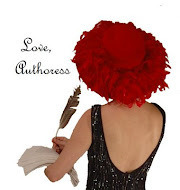
Who is that Masked er, Hatted woman?
Welcome to what will hopefully be the first of the Annual Authoress' Success Story blog tours! Those of us who have owed our publishing successes, at least in part, to the Miss Snark's First Victim contests and blog have decided to come together and help cross promote each other's work. Every day in the first two weeks of August, a different author will be posting an interview of one of our fellow Success Stories, so make sure to tune in to everyone's blogs (there's a list below the questions).
And now, I've got the great pleasure of interviewing Tara Dairman . Tara is a novelist, playwright, and recovering round-the-world traveler who now lives in Colorado. Her first middle-grade novel, The Delicious Double Life of Gladys Gatsby, will be published by Putnam/Penguin in 2014.
1) How did participating with MSFV blog get you where you are now?
In October 2011, I entered the first page of my novel into Authoress’s Secret Agent contest, where lurking agent Ammi-Joan Paquette of Erin Murphy Literary Agency (EMLA) read it and invited me to query her. EMLA is usually closed to unsolicited queries, so I was ecstatic to get this “in”…and even more ecstatic when Joan requested the full manuscript the day after she received my query.
Then, that December, I was lucky enough to make it to the final round of the Baker’s Dozen Agent Auction at MSFV, which led to a few offers of representation. I let Joan know as soon as I had an offer, and when she offered herself a few days later, I knew that she was the perfect fit for me.
 But before I even entered any contests, MSFV was extremely helpful in pushing me to get my opening pages into the best possible shape before querying. Reading through months of Secret Agent contests—seeing which entries grabbed me and which ones grabbed the agents, and why—was like taking a master class in how to entice a reader.
But before I even entered any contests, MSFV was extremely helpful in pushing me to get my opening pages into the best possible shape before querying. Reading through months of Secret Agent contests—seeing which entries grabbed me and which ones grabbed the agents, and why—was like taking a master class in how to entice a reader. 2) As a MG writer myself, I am so excited for your debut, The Delicious Double Life of Gladys Gatsby. Can you tell us about it?
Thank you, Angela!
Gladys Gatsby is an 11-year-old girl who loves to cook and dreams of one day becoming a restaurant critic for The New York Times—she just doesn’t expect for that to happen until she’s a lot older. But when an essay contest goes awry and Gladys’s entry ends up on a Times editor’s desk, she quickly finds herself contracted to review a fancy “dessert bistro” in Manhattan. Now, if she wants to meet her deadline, she has to find a way to get from the suburbs to the city without her fast-food-loving parents finding out what she’s up to or her editor finding out that she’s only in sixth grade. As you might expect, shenanigans ensue.
3) Is it true that your honeymoon lasted 2 years and that you traveled around the world? We need details! What was your favorite stop on this amazing tour? What prompted this amazing trip? Where would you go back to again if you could?
It’s true! Three weeks after we got married in 2009, my husband and I sold all of our possessions and embarked on a two-year, 74-country honeymoon. We backpacked through every country in South and Central America and about half the countries in Africa, followed by as much as we could cover of the Middle East, India, Southeast Asia, China, Mongolia, and Eastern Europe. We rarely spent more than three days in the same place, so it was a real whirlwind!
It’s impossible to pick a favorite stop, but I will say that traveling in Africa was extremely rewarding since so few tourists make the effort to go there. Sleeping on a Saharan dune in Mauritania, kayaking on Lake Malawi, observing lemurs in Madagascar, and eating our way through Ethiopia are definitely some of my favorite memories. And Moshi, Tanzania will always hold a special place in my heart, since that’s where I finished writing my first draft of Gladys Gatsby. You can find many more trip highlights our travel blog, www.andyandtara.com.
As for what prompted the trip, it was pretty simple: We both love traveling and were tired of our jobs and the New York grind, so we took getting married as an excuse to completely shake up our lives. And I would love to go back to Argentina and China—both such huge countries with so many amazing things to see and do (and eat)!
4) Your main character, Gladys Gatsby, is a real foodie...would you consider yourself a foodie as well?
 I hesitate to use the word foodie to describe myself, because except for very special occasions, I’m not really big on eating at fancy or trendy restaurants. Gladys definitely has fancier taste than I do. I guess that I’m more of a street foodie. =) And I do love to cook at home and try to replicate some of the amazing meals that I was served up at street stalls or in hole-in-the-wall restaurants around the world!
I hesitate to use the word foodie to describe myself, because except for very special occasions, I’m not really big on eating at fancy or trendy restaurants. Gladys definitely has fancier taste than I do. I guess that I’m more of a street foodie. =) And I do love to cook at home and try to replicate some of the amazing meals that I was served up at street stalls or in hole-in-the-wall restaurants around the world!5) Of all the things you ate all over the world, what dish was your favorite? What did you eat that you wish you hadn’t, and if you could take Gladys with you on another round the world trip, which delicious morsel would she want to try out most?
Oh, gosh, such good questions! I’ll force myself just to choose one favorite dish and name soto ayam (click for a recipe!) an Indonesian chicken soup with rice noodles and coconut milk and lemongrass. Variations are made all over Indonesia, but the version we loved came from a stall near the shore in Carita, Java, where we were the only tourists in town trying to hire a boat to sail us out to the Krakatau volcano. It took the family running the stall about an hour to make us the soup, but it was so incredible that we came back the following night and ordered it again. And I’m thrilled to report that I’ve tinkered with a few recipes and now make a pretty good version at home!
There’s not much I ate that I wish I hadn’t—it was fun to experiment and try new foods like camel (not my favorite, though one-humped tasted better than two-humped) and hippo and donkey (both delicious!). In Sichuan, China, they’re fond of cooking with a pepper that numbs your mouth and kind of makes you feel like you may be having a stroke, so I guess I’d rather not repeat that experience.
If Gladys went traveling with me, she’d definitely want to eat her way through India, and I don’t blame her! Maybe we’d start in Mumbai, which has an amazing mix of street food and posh-but-affordable restaurants.
Thanks, Tara!
 Tomorrow's post is at Tara’s interview of David Kazzie. See you there!
Tomorrow's post is at Tara’s interview of David Kazzie. See you there!Visit the whole crew & discover their MSFV Success Stories:
David Kazzie @davidkazzie *up tomorrow!
Leigh Talbert Moore @leightmoore
J.Anderson Coats @jandersoncoats
J.M. Frey @scifrey
Elissa Cruz @elissacruz
Amanda Sun @Amanda_Sun
Kristi Helvig @KristiHelvig
Leah Petersen @Leahpetersen
Monica Bustamante Wagner @Monica_BW
Emily Kokie @emkokie
Monica Goulet @MonicaGoulet
Peter Salomon @petersalomon
Sarah Brand @sarahbbrand
Angela Ackerman @angelaackerman & @writerthesaurus
Tara Dairman @TaraDairman

Published on August 14, 2012 03:24
August 11, 2012
Character Trait Entry: Mysterious
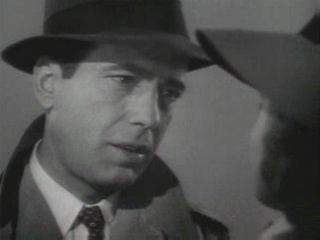
Definition : difficult to understand or figure out; secretive
Causes : having something to hide; an aversion to intimacy that makes it impossible to open up to others; trust issues; a deliberate desire to mystify and attract; a manipulative nature; misunderstood shyness or uncertainty; being privy to information that must be withheld from others
Characters in Literature & Pop Culture: Rick Blaine (Casablanca), The Cullens (Twilight), Jason Bourne, Aragorn (drool)
Positives : Mysterious characters are interesting. Whether they know something they won't reveal or they only have an air of mystery about them, they make us curious. People gravitate toward them. In a story, mysterious characters are cause for infinite speculation and What ifs. Anytime you can hint at something but keep readers guessing, they'll be more inclined to keep reading. Mysterious characters are also a great vehicle for misdirection and red herrings.
Negatives : Mysterious characters are aloof. They're often difficult to get to know on more than a surface level. If they're intentionally hiding information, they may mislead or lie to keep their secret. Mysterious characters are usually interesting because of what they're hiding; once the secret is revealed, friends, acquaintances, and readers may lose interest, so its important as the author to make sure there's more to your mysterious character than just the mystery.
Common Portrayals: The bad boy at school; magicians and wizards; spies; aliens and paranormals; foreigners
Clichés to Avoid: tall, dark, and mysterious; the stranger with the mysterious past; the mysterious person that people are inexplicably drawn to, against their common sense.
Twists on the Traditional Mysterious Character:
For some reason, most mysterious characters are men. Create a mysterious woman (with something other than sexual intrigue behind her mystery) and you'll have something fresh and underrepresented in literature.
Mysterious characters tend to appear out of seemingly nowhere with this huge question mark about their past. How about an Average Joe that comes back from a trip or school break with a new air of mystery about him?
The typical mysterious character is gloomy, brooding, and dark. What about the secretive person who is an optimist, or terminally cheerful?
Conflicting Characteristics to Make your Mysterious Character Unique or More Interesting: anxious, clumsy, naïve, happy, nosy, sweet, foolish
******
ALSO...
I'm at Twisted Minds and Dark Places today sharing Lessons Learned From Stephen King. Whether you're a fan or not, we can all learn something from The King. Stop by, and let me know if you agree :).

Published on August 11, 2012 05:00
August 10, 2012
Three Guest Posts, Two Giveaways!
Happy Friday, everyone! Summer is quickly coming to an end, which seems impossible since it just began, like, yesterday. My oldest starts pre-school in two weeks, which freaks me out slightly. But I'll be all right. Probably.
#deepbreaths
In the meantime, I'm popping around today, hanging out with friends and talking writer stuff:

First, I'm visiting Thoughts at One in the Morning to talk about The Biggest Distractions that Keep Writers from Finishing.

Then I'm wandering down The Writing Lane, musing on my Top 5 Must-Have Emotions in a Story.

To end strong, I'm headed to an interview at Nicole Zoltack's, where I'll be discussing what I'm reading now, and which paranormal creature I'd most like to be. Any guesses?
And, because it's Friday and we feel the need to celebrate, two of these posts come with a GIVEAWAY! So if you're interested in scoring a copy of The Emotion Thesaurus or know someone who is, enter to win at one of the above blogs. Have a great Friday and a great weekend!

#deepbreaths
In the meantime, I'm popping around today, hanging out with friends and talking writer stuff:

First, I'm visiting Thoughts at One in the Morning to talk about The Biggest Distractions that Keep Writers from Finishing.

Then I'm wandering down The Writing Lane, musing on my Top 5 Must-Have Emotions in a Story.

To end strong, I'm headed to an interview at Nicole Zoltack's, where I'll be discussing what I'm reading now, and which paranormal creature I'd most like to be. Any guesses?
And, because it's Friday and we feel the need to celebrate, two of these posts come with a GIVEAWAY! So if you're interested in scoring a copy of The Emotion Thesaurus or know someone who is, enter to win at one of the above blogs. Have a great Friday and a great weekend!

Published on August 10, 2012 04:34
Writers Helping Writers
A place for writers to find support, helpful articles on writing craft, and an array of unique (and free!) writing tools you can't find elsewhere. We are known far and wide for our "Descriptive Thesau
A place for writers to find support, helpful articles on writing craft, and an array of unique (and free!) writing tools you can't find elsewhere. We are known far and wide for our "Descriptive Thesaurus Collections" which help authors create vivid imagery and sensory detail for their Settings, Characters (physical descriptions, emotions, skills & talents, etc.), Symbolism, Weather, and a whole bunch more. Stop in and say hello! :) http://writershelpingwriters.net/
...more
- Angela Ackerman's profile
- 1023 followers



